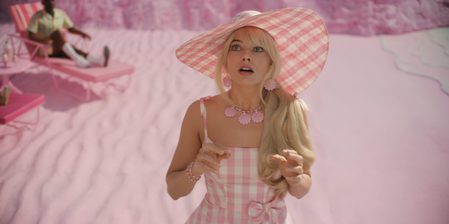SUMMARY
This is AI generated summarization, which may have errors. For context, always refer to the full article.
![[OPINION] ‘Barbie’ awakens: A response to the film being called ‘woke propaganda’](https://www.rappler.com/tachyon/2023/08/barbie-imho-aug-1-2023.jpeg)
As I fought off drowsiness on a rainy Thursday evening, the review piece “Barbie turned woke,” published by the Inquirer, surprisingly woke me up in a way Ryan Gosling’s chiseled physique never could!
The Barbie movie has ignited a firestorm of debates and reactions, dividing audiences and critics. Some hail its audacity to delve into modern socio-political themes, while others — like the author of the Inquirer article, who said the Greta Gerwig film is “a woke propaganda piece of a movie” disguised as a faithful depiction of Barbie — see it as a misstep in portraying the iconic doll.
The Inquirer article also criticizes “wokeness in Hollywood,” deeming it “not normal at all.” This perspective can call for regression and exclusion of voices and experiences that are integral to creating a more inclusive and compassionate society. Movies have evolved to allow marginalized groups to see themselves onscreen and be celebrated. Some may perceive this as “not normal,” but the notion of “normalcy” is not fixed and can vary from one culture to another. There’s a growing movement to promote inclusivity in society, especially in media, and this movement is in harmony with the evolving nature of our contemporary world.
Labeling movies as “woke propaganda” oversimplifies the complexities of modern filmmaking. Filmmakers often take inspiration from real-world events or phenomena to create narratives that various audiences can relate to. Initially, the term “wokeness” emerged as a conscious effort to address social injustices and challenge the status quo. However, over time, the term “woke” has been hijacked and turned into a means of attacking or ridiculing those who genuinely seek to address social issues and promote equality.
Similarly, Barbie has long embodied the essence of being “woke.” What once began as a simple toy has evolved into a potent symbol of empowerment and inspiration. With her transformation, Barbie now represents confidence and serves as an influential role model for children, particularly girls, encouraging them to pursue their aspirations and embrace their true selves. The idea of a movie emphasizing that Barbie is more than just a toy is essential for young moviegoers to grasp and appreciate.
A beloved symbol of beauty and dreams, Barbie has woven her way into millions of hearts worldwide. The movie’s “risky” choice to transplant her into the real world, with all its complexities, may have disappointed those seeking a nostalgic escape to her enchanting dreamland.
But storytelling evolves alongside society. As a cultural icon, Barbie can’t remain untouched by the times we live in. The film embraces current social issues, seeking to resonate with a new generation hungry for meaningful narratives. Though some “woke” themes may not resonate with all, cinema has always been a platform for exploring and confronting societal matters.
In our fast-changing world, traditional ideas of beauty and success are breaking stereotypes. By placing Barbie in a scenario where she needs to adapt to contemporary norms, we allow her to confront the challenges of the modern era, and we open up an avenue for meaningful conversations about personal growth.
The Barbie movie goes beyond being a film centered on a plastic icon. It uses Barbie as the central figure to present an ingenious allegory for exploring the multifaceted nature of human existence. While unexpected to a lot of people, the movie’s depth serves as a testament to the power of storytelling, exemplifying how meaningful stories can emerge from the most unlikely sources. Through Barbie’s journey, the film unpacks the intricacies of identity formation, prompting audiences to reflect on their evolving perceptions of self amidst societal pressures.
It’s important to discern genuine attempts to address pressing issues from instances where social messaging overshadows storytelling. If a movie that genuinely intends to promote inclusivity and break barriers is unfairly branded as “woke propaganda,” it is not only those who are open-minded and supportive of the movie’s message that should feel offended but, more importantly, the filmmakers themselves. The labeling undermines the latter’s intentions, suggesting they are only pushing an agenda rather than creating a meaningful piece of storytelling. Their artistic efforts dedicated to making a progressive impact deserve applause, not the eyerolls of those who prefer their worldviews served on a narrow-minded platter.
As consumers of films, we should consistently encourage filmmakers to uphold a standard that allows cinema to constantly inspire, provoke, and deeply connect with future generations. In doing so, we can cultivate a cinematic landscape that not only entertains but also encourages positive change in society. – Rappler.com
Ralph Revelar Sarza is a writer committed to confronting detrimental societal norms. He is @walphs on Instagram and Twitter.
Add a comment
How does this make you feel?

There are no comments yet. Add your comment to start the conversation.